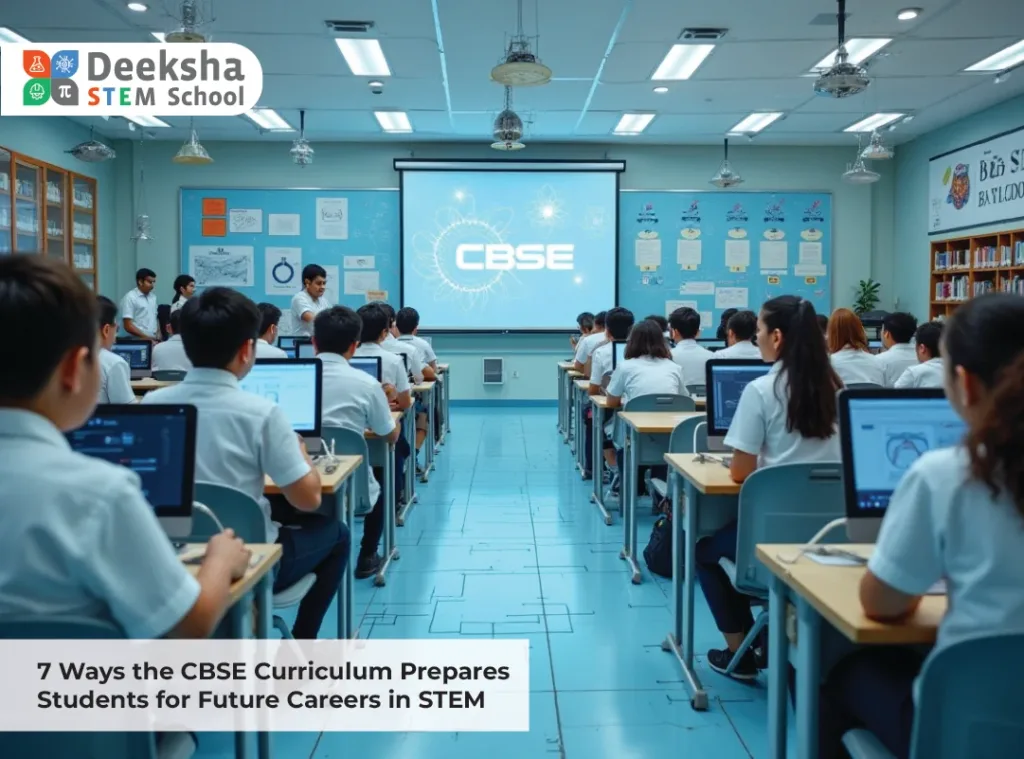In today’s fast-paced, technology-driven world, Science, Technology, Engineering, and Mathematics (STEM) skills are no longer optional—they are essential for success in the careers of tomorrow. As industries continue to evolve due to rapid advancements in automation, artificial intelligence, biotechnology, and data science, the demand for individuals proficient in STEM has reached an all-time high. STEM competencies have become critical not only for innovation but also for global competitiveness, problem-solving, and the ability to adapt to technological change.
The CBSE curriculum provides a strong foundation for students to develop these future-ready skills, equipping them to thrive in a rapidly advancing technological landscape. With its structured framework and emphasis on practical application, the CBSE system encourages creativity, critical thinking, and scientific inquiry from an early age. At Deeksha STEM Schools, we integrate the CBSE syllabus with a robust focus on STEM education, ensuring students gain hands-on experience and theoretical knowledge that prepares them for future careers. Here are 7 ways the CBSE curriculum prepares students for successful careers in STEM.
1. Strong Focus on Analytical and Logical Thinking
One of the greatest strengths of the CBSE curriculum is its emphasis on developing analytical and logical reasoning skills. These are vital in STEM fields, where problem-solving and decision-making require a methodical and evidence-based approach. The curriculum challenges students to:
- Analyze complex problems systematically: This includes breaking down challenging concepts into smaller components to understand and solve them effectively.
- Develop logical solutions based on evidence: Students learn to rely on factual data, conducting experiments and analyzing outcomes to reach conclusions.
- Apply theoretical knowledge to real-life scenarios: Practical case studies and real-world examples are incorporated to deepen understanding.
These skills are especially relevant for future careers in data science, software engineering, and artificial intelligence, where structured thinking and logic-based decision-making are fundamental.
2. Comprehensive Science and Mathematics Framework
The CBSE curriculum provides a solid foundation in science and mathematics—two of the most critical pillars of STEM education. The well-structured syllabus ensures that students gain:
- Scientific Literacy: Understanding key concepts across physics, chemistry, biology, and environmental science, enabling students to grasp advanced scientific theories in higher education.
- Mathematical Proficiency: The curriculum covers essential mathematical disciplines such as algebra, calculus, geometry, and statistics, all of which are vital in fields like finance, computer programming, and engineering design.
- Hands-On Experiments: Regular laboratory sessions encourage students to test hypotheses, observe phenomena, and draw scientific conclusions, fostering discovery and innovation.
This comprehensive academic framework lays the groundwork for students to excel in specialized STEM fields, from advanced engineering roles to cutting-edge biotechnology research.
3. Project-Based Learning and Research Opportunities
The CBSE curriculum actively promotes project-based learning, encouraging students to take ownership of their educational journey. These hands-on projects help students:
- Apply theoretical knowledge to solve real-world problems: Assignments and projects often require practical application, simulating professional environments.
- Develop research skills through investigations: Students learn how to formulate hypotheses, gather data, analyze results, and present their findings.
- Collaborate with peers on group assignments: These projects foster teamwork, leadership skills, and the ability to work in diverse teams.
By engaging with real-world challenges, students gain research skills, problem-solving experience, and the ability to innovate—qualities that are highly sought after in fields such as environmental engineering, AI research, and technological entrepreneurship.
4. Emphasis on Digital Literacy and Technological Integration
As the world becomes increasingly digitized, the CBSE curriculum has adapted to incorporate technological tools and resources into everyday learning:
- ICT Integration: Students learn to use technology to conduct research, create presentations, and engage with digital educational resources, promoting technological fluency.
- Coding and Programming Opportunities: The introduction of basic programming languages like Python, Java, and Scratch equips students with essential coding skills necessary for careers in software development, cybersecurity, and data science.
- E-Learning Platforms and Online Resources: Digital platforms enable students to access supplementary materials, take interactive quizzes, and participate in virtual classrooms, fostering self-paced learning.
These initiatives help students gain confidence in using technology, preparing them for a range of tech-driven careers in the digital economy.
5. Focus on Critical Thinking, Innovation, and Creative Problem-Solving
In today’s innovation-driven world, the ability to think creatively and approach challenges from multiple perspectives is highly valued. The CBSE curriculum encourages:
- Higher-Order Thinking Questions (HOTs): These stimulate intellectual curiosity and encourage students to think beyond rote learning.
- Innovation and Entrepreneurship Programs: Many CBSE schools, including Deeksha STEM Schools, incorporate programs that inspire students to develop business models, propose innovative ideas, and present their entrepreneurial ventures.
- Creative Assignments: Incorporating elements of art, design, and multimedia into STEM projects, encouraging students to develop interdisciplinary problem-solving skills.
This emphasis on innovation fosters a growth mindset, preparing students to excel in sectors like renewable energy, biotechnology, software development, and engineering.
6. Development of Collaboration, Communication, and Teamwork Skills
In the modern workplace, technical expertise must be complemented by strong communication and collaboration skills. The CBSE curriculum helps develop these soft skills through:
- Group Projects: Students collaborate on assignments that require shared responsibilities, fostering leadership, teamwork, and peer learning.
- Presentations, Debates, and Public Speaking: Regular opportunities to present findings and debate on scientific topics build confidence and articulation skills.
- STEM Clubs and Extracurricular Activities: Participation in science fairs, coding clubs, hackathons, and robotics competitions encourages collaboration in competitive and creative environments.
These essential soft skills ensure students can effectively work in multidisciplinary teams, a necessity for collaborative environments in STEM industries.
7. Preparation for Competitive Exams and Global Career Opportunities
The CBSE curriculum is renowned for its focus on preparing students for competitive examinations and global academic challenges:
- Preparation for National-Level Exams: Exams such as JEE (for engineering) and NEET (for medical fields) require a deep understanding of scientific concepts, and the CBSE syllabus is specifically designed to help students succeed in these rigorous assessments.
- Participation in National Science Olympiads: Encourages scientific thinking and intellectual competitiveness, fostering interest in advanced scientific research.
- Global STEM Competitions: Students are encouraged to participate in international innovation challenges, hackathons, and research programs that promote global exposure and collaboration.
This competitive preparation ensures that students can excel not just nationally but also in international academic environments, opening doors to scholarships, research opportunities, and top-tier global institutions.
Conclusion
The CBSE curriculum offers a comprehensive framework that prepares students for a future defined by innovation, technology, and scientific discovery. By fostering analytical thinking, digital literacy, scientific inquiry, collaboration, and creativity, it equips students with essential skills for navigating the evolving technological landscape.
At Deeksha STEM Schools, we enhance the CBSE framework by integrating cutting-edge STEM education and practical learning experiences. Our mission is to nurture tomorrow’s innovators, leaders, and problem-solvers. If you want your child to thrive in the fields of science, technology, engineering, and mathematics, explore the transformative educational opportunities available at Deeksha STEM Schools today.






Leave A Comment